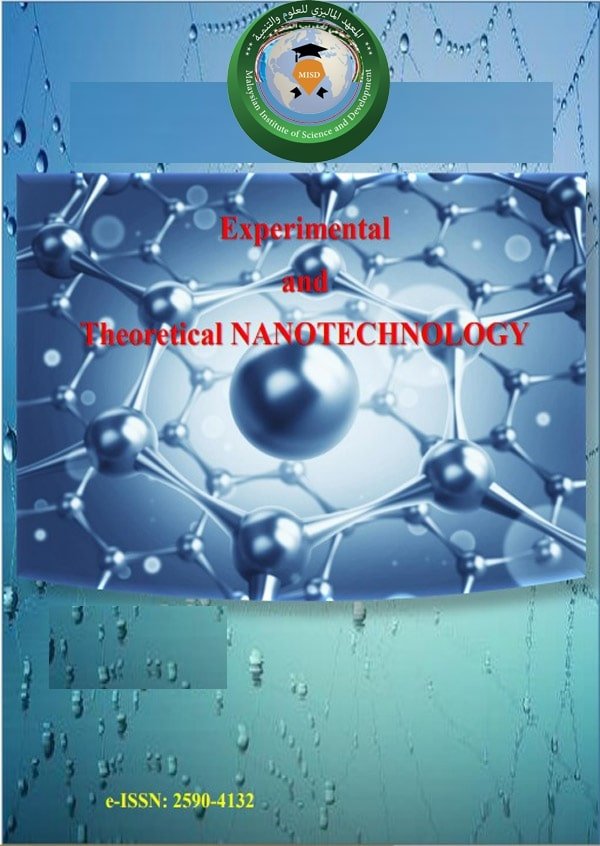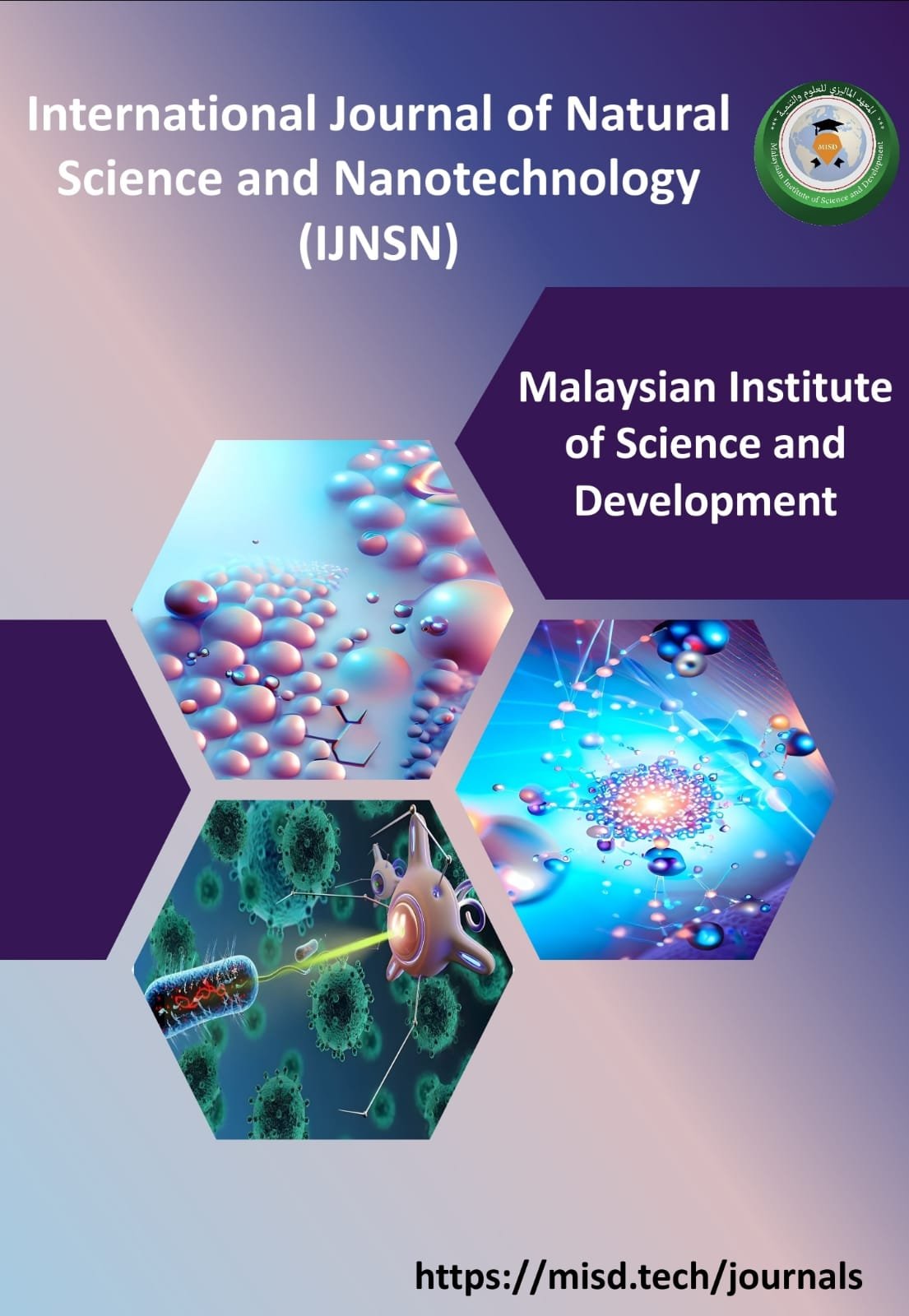- LATEST
-
- surface morphology and effect of particle sizes on the electrical conductivity of feal2o3 composite
- preparation of bio-nanoparticles adsorbent derivative from iraqi date seeds for the removal of pollutants from aqueous solutions
- gaas1-xnx candidate material for a high efficiency based homojunction solar cell
- development of step-wise functionally graded materials nano (3ypsz/al2o3) with improved fracture toughness and low thermal degradation for hip joint replacements
- choose the suitable fuzzy membership function in prediction of diameter of nanofibers produced from electrospinning using fuzzy logic system as artificial intelligence technique
- electronic studies of alloy ga1-xalxn alloys
- manufacturing of npk nano fertilizer and its effect on growth and of cut flowers production in two types of rosa spp
- modeling of electronic structure for dome-shaped quantum dots
- characterization of carbon nanotubes by chemical vapor deposition
- characterization of bifeo3 nanotube and y-junction bifeo3 nanotubes
- optical properties and ft-ir spectra of pani/f-mwcnt thin films
- simulation design of silver nanoparticle coated photonic crystal fiber sensor based on surface plasmon resonance
- enhancement of low carbon steel corrosion resistance in acidic and saline media using superhydrophobic nanocomposite
- modified callaway model calculations for lattice thermal conductivity of a 20 nm diameter silicon nanowire
- optical studies of inas/gaas quantum dot stacks for photovoltaic applications
- temperature dependence of optical study of ingan qds
- structural properties of cdse nanocrystals in cdse/se multilayer
- annealing temperature effect on optical properties of cr-implanted zno nanostructure
- morphology and optical properties of zinc oxide porous structures
- analysis and characterization of tin-doped zno nanostructures
- enhancement of low carbon steel corrosion resistance in acidic and saline media using superhydrophobic nanocomposite
- modified callaway model calculations for lattice thermal conductivity of a 20 nm diameter silicon nanowire
- simulation design of silver nanoparticle coated photonic crystal fiber sensor based on surface plasmon resonance
- optical properties and ft-ir spectra of pani/f-mwcnt thin films
- acousto- and acousto-optic effects in liquid crystals: an overview
- band gap in photocatalytic zno–tio2
- structural and optical investigations of cobalt oxide nanoparticles
- morphological studies of p-type mn-doped sno2 nanostructure
- morphology study of 1d zno nanorods
- structural properties of ordered porous sno2 nanostructure
- thinning energy effect on the fluctuations of charged particles lateral distribution produced in extensive air showers
- effect of some factors and variables on the frequency - time distribution of the otoacoustic emissions
- morphology of electrospun pva nanofibers enhanced with graphene oxide, poly (3,4-ethylenedioxythiophene): polystyrene sulfonate (pedot:pss) and multiwalled carbon nanotubes
- analysis and characterization of zno nanowires for sensing applications
- preparation, analysis and characterization of ito nanostructures
- optical properties of reduced grapheneoxidesheets
- optical and structural of nanocrystalline cds
- synthesis and characterization of zno nanoflowers under temperature effect
- solar energy harvesting efficiency of nano-antennas
- tio2 nanorods with cds quantum dots for optical applications
- evaluation of uranium concentration in soil samples of al-diwaniya governorates using icp-mass techniques
- study the effect of different dilutions from filtrates of two fungi alternaria alternata and aspergillus flavus on the ground beetles adults (carabidae: coleoptera) harpalus rufipes
- the influence of rf power, pressure and substrate temperature on the energy gap to vanadium oxide at tallness wave stir 290 nm of rf sputtered
- fabrication of nio/psi for gas sensor application prepared by chemical method
- synthesis of cds nanotubes and nanospheres by living bio-membrane bi-template
- structural and optical properties of lead iodide nanostructure synthesized by vacuum evaporation method
- zno-based sensors with controlled ethanol sensing
- cytotoxicity and apoptotic activity of magnesium orotate nanoparticles towards human hepatoma cell line hepg2
- numerical investigation of heat transfer augmentation in curved channel using hybrid nanofluids
- synthesis of gan nanowires by ammoniating ga2o3/bn
- synthesis of cu2s nanostructures using microwave method
- phase transition of inn films via trimethylindium flows
- analysis and characterisation of polycrystalline zns nanostructure
- evaluation of the effect of gibberellic acid (ga3) to reducing the harmful effect of water shortage on the corn
- analysis of the current-voltage characteristic of the schottky diode based on free-standing gan substrate
- a nano-spectral study of charge transfer complexes to alizarin dye with electronic acceptors (tio2)
- synthesis and characterization of gan nanocrystalline thin films on various substrates by rf magnetron sputtering
- experimental and numerical investigations for combined blade vertical axis wind turbine
- optical properties of tio2 nanofibers
- structural and optical studies of nanocrystallined cds
- theoretical studies on hemoglobin periodic structure sensor
- characterization of diode laser pumped "nd:yvo4 disk laser
- natural convection in inclined channel for air cooling of photovoltaic panels
- surface plasmon polariton in multilayered configuration
- analysis and investigations of the iron addition on the synthesis of high-performance ceramic-matrix composites (cmcs) by electro-thermal explosion reaction in the tio2–al–c system
- engineered ‘nanomaterials by design’ theoretical studies experimental validations current and future prospects
- electronic, magnetic and elastic properties of new half-heusler compounds xbaga(x=li, na, kandrb)
- analysis and characterization of sio2nanowires via electrospinning technique
- si-doped polycrystalline via chemical deposition
- structural properties of bapb1-xbixo3nanostructures
- optical and structural properties of zinc oxide nanocrystalline
- correlation between crystal defects and band gap of zno nanobelts
- structural and optical properties of nanoparticulate y2o3:eu2o3
- structural and optical analysis of chalcogenide nanostructures
- growing one-dimensional zno nanostructures
- fabrication of superconducting ybco agglomerated particles (anps) by electrospinning
- laser-induced breakdown spectroscopy (libs) technique for the characterization of iraqi cement
- enhancement of the photovoltaic thermal system performance using dual cooling techniques
- oxide and metallic materials for photovoltaic applications: a review
- effect of particle size distribution on the magnetization of ferrofluid
- analytical studies of electrohydrodynamically tio2 nanostructure
- zno nanowire arrays for uv photodetector
- cd concentration effect on structural, optical and electrical properties of cu2(cdxzn1-x)sns4
- tio2/bi5o7i nanocomposite for photoanode of electrochemical cell
- performance evaluation of millimeter wave 5g networks for variable antennas configurations
- magnetic properties of oxide dispersion strengthened (ods) ferritic steel
- phononic band gap with/without a defect layer in periodic and quasi-periodic structure
- application of laser scribed method to fabricate graphene/graphene oxide multilayer
- linear and nonlinear optical properties of zno-tio2- pmma nanohybrids
- preparation and investigation on thermal properties of copper oxide nanofluid for solar energy absorption
- analytical modeling and simulation of advanced silicon nanowire transistors
- zno/tio2 nanocomposites semiconductor for anti-bacterial applications and dye sensitized solar cell applications
- influence of three-hydroxy-2-naphthoic acid functionalized swcnts on the electrical and mechanical properties of poly (vinyl chloride)
- surface plasmon resonance sensor sensitivity enhancement using gold- dielectric material
- overview of spectrum sensing technologies for satellite and space communications based on cognitive radio networks
- theoretical investigation of slow-light vcsel amplifier
- estimation of the stored energy of dislocation for plastically deformed 6082 heat treatable al-alloy
- formation and migration of dislocations produced by plastic deformation in 1070 al-alloy
- space-based nano-material enhanced solar laser system simulation for transferring power onto the earth
- analysis of reliability for fault tolerant design in nano cmos logic circuit
- cuo nps incorporated single and double junction polymer solar cells
- comparison of spectral properties of rohdamin 6g dye
- carbon nano tube field effect transistor based bblptl full adders with level restorer structures
- surface plasmon polariton in metal-insulator-metal configuration
- structural, magnetic, electric and electronic aspects of the ba2ybsbo6 perovskite material
- single walled carbon nanotubes reinforced intermetallic tini matrix nanocomposites by spark plasma sintering
- numerical investigation of natural convection heat transfer in a cavity utilizing al2o3-water nanofluid: effect of baffle height
- modelling of silicon based electrostatic energy harvester for cardiac implants
- comparative study of attenuation properties of some ternary borate glass systems
- optical properties of gelatin/tgs composites
- study of non-ohmic electrical behavior and microstructure of zno-v2o5 varistor
- solid phase microextraction based micro-device for extraction of pcr amplifiable dna
- effect of annealing temperature on the optical and electrical properties of mg doped tio2 thin films
- nano-ceramics ti3sic2 max phase reinforced single walled carbon nanotubes by spark plasma sintering
- copolysiloxane solvent detector using langmuir-blodgett surface potential method
- optical properties of manganese chiral single ring by glancing angle deposition technique
- analysis of flip flop design using nanoelectronic single electron transistor
- tunable carbon quantum dots from starch via microwave assisted carbonization
- the effect of additives on behavior of the high temperature laxy1-xba2cu3o7-δ superconductor

Journal of Experimental and Theoretical NANOTECHNOLOGY
About the Journal :
Experimental and Theoretical NANOTECHNOLOGY (ETN) abbreviated as Exp. Theo. NANOTECHNOLOGY is a multidisciplinary peer-reviewed and open access journal. It includes specialized research papers, short communications, reviews and selected conference papers in special issues on the characterization, synthesis, processing, structure and properties of different principles and applications of nanotechnology with focus on advantageous achievements and applications for the specialists in engineering, chemistry, physics, materials science and medicine. ETN covers and publishes all aspects of fundamental and applied researches of experimental and theoretical nanoscale technology dealing with materials synthesis, processing, nanofabrication, nanoprobes, spectroscopy, properties, biological systems, nanostructures, nanoelectronics, nano-optics, nano-mechanics, nanodevices, nanobiotechnology, nanomedicine, nanotoxicology within the scope of the journal. ETN aims to acquire the recent and outstanding researches for the benefit of the human being.
ZNO/TIO2 NANOCOMPOSITES SEMICONDUCTOR FOR ANTI-BACTERIAL APPLICATIONS AND DYE SENSITIZED SOLAR CELL APPLICATIONS
ZnO/TiO2 Nanocomposites Semiconductor for Anti-Bacterial Applications and Dye Sensitized Solar Cell applications
The synthesis of high quality ZnO doped TiO2 nanoplatelets were synthesized by hydrothermal method at room temperature (RT). Composition, structure and micro morphology of the nanoplatelets were analyzed and determined by X-ray diffraction (XRD) confirms that crystal structure of doped (Zn-Ti-O) composition the identify peaks of (002), (100) and (101) clearly showed hexagonal wurtzite-type structure of ZnO with same lattice constants of the same; a=b=3.249 Å and c= 5.219 Å. From the XRD results revealed that crystal properties of the doped samples are improved without affecting the parent lattice. The morphological and optical properties of Zn-Ti-O nanosamples were characterized by scanning eelectron microscopy (SEM). TEM observation shows that the ZnO/TiO2 nanoplatelets synthesized by hydrothermal synthesis are well dispersed and the average crystallite size was found to be 10 nm. Biological applications of bacterial strains were calculated for these samples. The antibacterial activity of ZnO/TiO2 and its doping was evaluated on bacteria strains like Escherichia coli, Pseudomonas aeruginosa and Staphylococcus aureus. The results obtained in this study suggested that the ZnO/TiO2 and its doping have potential for use in the treatment of diseases caused by these test organisms.








 العربية
العربية